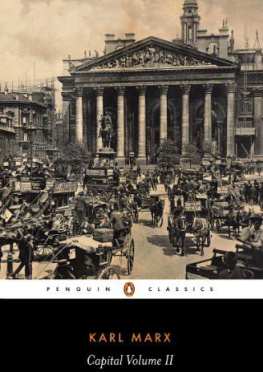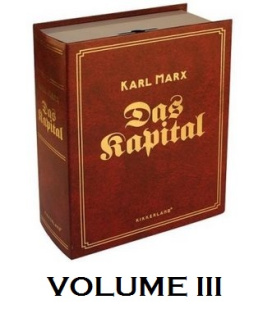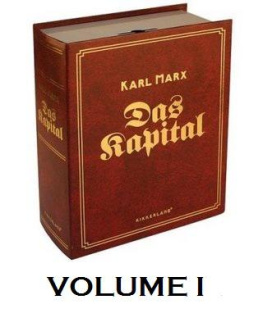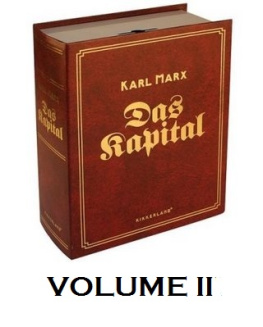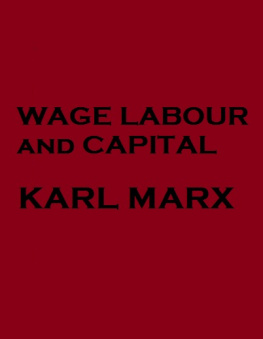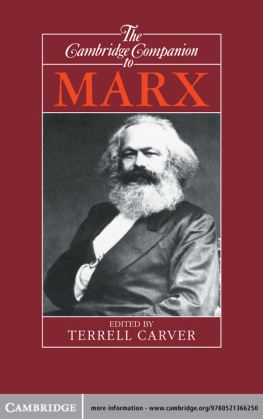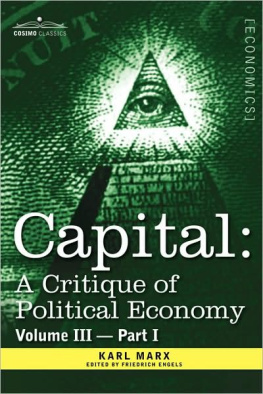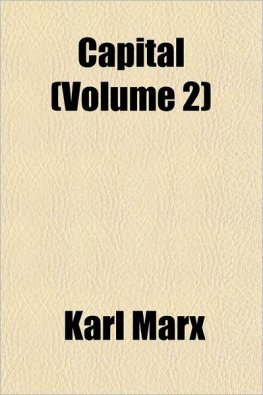Karl Marx - Capital (3 Volume)
Here you can read online Karl Marx - Capital (3 Volume) full text of the book (entire story) in english for free. Download pdf and epub, get meaning, cover and reviews about this ebook. year: 2004, publisher: Penguin Books, genre: Science. Description of the work, (preface) as well as reviews are available. Best literature library LitArk.com created for fans of good reading and offers a wide selection of genres:
Romance novel
Science fiction
Adventure
Detective
Science
History
Home and family
Prose
Art
Politics
Computer
Non-fiction
Religion
Business
Children
Humor
Choose a favorite category and find really read worthwhile books. Enjoy immersion in the world of imagination, feel the emotions of the characters or learn something new for yourself, make an fascinating discovery.
Capital (3 Volume): summary, description and annotation
We offer to read an annotation, description, summary or preface (depends on what the author of the book "Capital (3 Volume)" wrote himself). If you haven't found the necessary information about the book — write in the comments, we will try to find it.
Capital (3 Volume) — read online for free the complete book (whole text) full work
Below is the text of the book, divided by pages. System saving the place of the last page read, allows you to conveniently read the book "Capital (3 Volume)" online for free, without having to search again every time where you left off. Put a bookmark, and you can go to the page where you finished reading at any time.
Font size:
Interval:
Bookmark:


VOLUME 1
KARL MARX was born at Trier in 1818 of a German-Jewish family converted to Christianity. As a student in Bonn and Berlin he was influenced by Hegels dialectic, but he later reacted against idealist philosophy and began to develop his theory of historical materialism. He related the state of society to its economic foundations and mode of production, and recommended armed revolution on the part of the proletariat. In Paris in 1844 Marx met Friedrich Engels, with whom he formed a life-long partnership. Together they prepared the Manifesto of the Communist Party (1848) as a statement of the Communist Leagues policy. In 1848 Marx returned to Germany and took an active part in the unsuccessful democratic revolution. The following year he arrived in England as a refugee and lived in London until his death in 1883. Helped financially by Engels, Marx and his family nevertheless lived in great poverty. After years of research (mostly carried out in the British Museum), he published in 1867 the first volume of his great work, Capital. From 1864 to 1872 Marx played a leading role in the International Working Mens Association, and his last years saw the development of the first mass workers parties founded on avowedly Marxist principles. Besides the two posthumous volumes of Capital compiled by Engels, Karl Marxs other writings include The German Ideology, The Poverty of Philosophy, The 18th Brumaire of Louis Bonaparte, The Civil War in France, A Contribution to the Critique of Political Economy, Grundrisse: Foundations of the Critique of Political Economy and Theories of Surplus-Value.
ERNEST MANDEL was born in 1923. He was educated at the Free University of Brussels, where he was later Professor for many years, and the cole Pratique des Hautes tudes in Paris. He gained his Ph.D. from the Free University of Berlin. He was a Member of the Economic Studies Commission of FGTB (Belgian TUC) from 1954 to 1963 and was chosen for the annual Alfred Marshall Lectures by Cambridge University in 1978. His many books include The Formation of the Economic Thought of Karl Marx, Late Capitalism, The Long Waves of Capitalist Development, The Second Slump and The Marxist Theory of Bureaucracy. His influential pamphlet, An Introduction to Marxist Economics, sold over half a million copies and was translated into thirty languages. Ernest Mandel died in July 1995. In its obituary the Guardian described him as one of the most creative and independent-minded revolutionary Marxist thinkers of the post-war world.
KARL MARX
A Critique of
Political Economy
Volume One
Introduced by
Ernest Mandel
Translated by
Ben Fowkes
Penguin Books
in association with New Left Review
PENGUIN BOOKS
Published by the Penguin Group
Penguin Books Ltd, 80 Strand, London WC2R 0RL, England
Penguin Putnam Inc., 375 Hudson Street, New York, New York 10014, USA
Penguin Books Australia Ltd, 250 Camberwell Road, Camberwell, Victoria 3124, Australia
Penguin Books Canada Ltd, 10 Alcorn Avenue, Toronto, Ontario, Canada M4V 3B2
Penguin Books India (P) Ltd, 11 Community Centre, Panchsheel Park, New Delhi 110 017, India
Penguin Books (NZ) Ltd, Cnr Rosedale and Airborne Roads, Albany, Auckland, New Zealand
Penguin Books (South Africa) (Pty) Ltd, 24 Sturdee Avenue, Rosebank 2196, South Africa
Penguin Books Ltd, Registered Offices: 80 Strand, London WC2R 0RL, England
www.penguin.com
This edition first published in Pelican Books 1976
Reprinted in Penguin Classics 1990
Edition and notes copyright New Left Review, 1976
Introduction copyright Ernest Mandel, 1976
Translation copyright Ben Fowkes, 1976
Appendix translation copyright Rodney Livingstone, 1976
All rights reserved
Except in the United States of America, this book is sold subject to the condition that it shall not, by way of trade or otherwise, be lent, re-sold, hired out, or otherwise circulated without the publishers prior consent in any form of binding or cover other than that in which it is published and without a similar condition including this condition being imposed on the subsequent purchaser
9. The Health and Education Causes of the Factory Acts.
The General Extension of Factory
Legislation in England
III. Capitalist Production is the Production and
Reproduction of the Specifically Capitalist Relations of Production
When Volume 1 of Capital was first published, capitalist industry, though predominant in a few Western European countries, still appeared as an isolated island encircled by a sea of independent farmers and handicraftsmen which covered the whole world, including the greater part even of Europe. What Marxs Capital explained, however, was above all the ruthless and irresistible impulse to growth which characterizes production for private profit and the predominant use of profit for capital accumulation. Since Marx wrote, capitalist technology and industry have indeed spread all over the world. As they have done so, moreover, not only have material wealth and the possibilities for freeing mankind definitively from the burden of meaningless, repetitive and mechanical work increased, but so too has the polarization of society between fewer and fewer owners of capital and more and more workers of hand and brain, forced to sell their labour-power to these owners. The concentration of wealth and power in a small number of giant industrial and financial corporations has brought with it an increasingly universal struggle between Capital and Labour.
Periodically the bourgeois class and its ideologues have thought they have found the stone of wisdom; have felt able, accordingly, to announce the end of crises and socio-economic contradictions in the capitalist system. But despite Keynesian techniques, notwithstanding all the various attempts to integrate the working class into late capitalism, for over a decade now the system has appeared if anything more crisis-ridden than when Marx wrote Capital. From the Vietnam war to the turmoil of the world monetary system; from the upsurge of radical workers struggles in Western Europe since 1968 to the rejection of bourgeois values and culture by large numbers of young people throughout the world; from the ecology and energy crises to the recurrent economic recessions: there is no need to look very far for indications that capitalisms heyday is over. Capital explains why the sharpening contradictions of the system were as inevitable as its impetuous growth. In that sense, contrary to a generally accepted belief, Marx is much more an economist of the twentieth century than of the nineteenth. Todays Western world is much nearer to the pure model of Capital than was the world in which it was composed.
In Capital Marxs fundamental aim was to lay bare the laws of motion which govern the origins, the rise, the development, the decline and the disappearance of a given social form of economic organization: the capitalist mode of production. He was not seeking universal laws of economic organization. Indeed, one of the essential theses of Capital is that no such laws exist. For Marx, there are no economic laws valid for each and every basically different form of society (aside from trivialities like the formula which points out that no society can consume more than it produces without reducing its stock of wealth whether the natural fertility of the land, the total population, the mass of means of production, or several of these). Each specific social form of economic organization has its own specific economic laws.
Font size:
Interval:
Bookmark:
Similar books «Capital (3 Volume)»
Look at similar books to Capital (3 Volume). We have selected literature similar in name and meaning in the hope of providing readers with more options to find new, interesting, not yet read works.
Discussion, reviews of the book Capital (3 Volume) and just readers' own opinions. Leave your comments, write what you think about the work, its meaning or the main characters. Specify what exactly you liked and what you didn't like, and why you think so.



